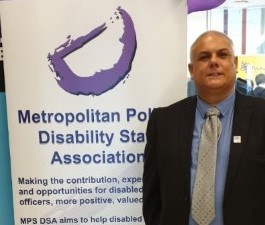This article was kindly provided to us by the Metropolitan Police Service Disability Staff Association and first appeared on the MPS intranet
Today marks the end of Disability History Month, which began on the 18th November. To mark the occasion, we spoke to the Chair of the MPS DSA, Detective Sergeant Dave Campbell, and to two serving disabled officers, DC Stephen Lewis and PC Phil Lewis, about their experiences in the organisation.
DS Dave Campbell

Up until the 1950s, people with physical, mental and learning disabilities were often ignored by society and access to jobs and support was practically non-existent, unless individuals were prepared to be exploited, undertaking menial and degrading tasks which offered little in the way of subsistence. Support was mainly through families as very little was provided by the authorities. Unfortunately, many of these outdated social attitudes and stigma still exist today in some form.
Certainly in the police service, people were often pensioned off for being ‘worn out’, ‘mentally debilitated’ or ‘debilitated due to injury’. These terms covered a wide range of injuries, but essentially if you could no longer walk the beat or place hands on prisoners, you were pensioned off.
Society had limited tolerance or understanding of disabled people, who were often seen as third-class citizens, shunned by their peers who had to endure socio-economic deprivation and abuse, with little chance of accessing public service assistance. Few believed that public expense should be used to assist. If you had a mental illness or a neurodivergent condition, you were more susceptible to being placed in an institution or in extreme cases, used in the name of medical science.
The First World War brought a level of disability awareness to society on a mass scale when many troops returned home with physical and mental disabilities, like blindness, loss of hearing, loss of limbs, mental trauma (PTSD) and loss of various bodily functions. The care provided to returning troops highlighted inequalities and deficiencies in our care of disabled persons but unfortunately it would take 70 years before significant changes in our attitudes took place.
Attitudes did start to shift by the end of the 1960s as it became clear that the quality of care in long-stay hospitals, the responsibilities of local authorities and health care in terms of disability (particularly mental disability) was often extremely poor. With the civil rights movements of the 1960s, it was identified that disabled people also had a right to expect a level of support and care as part of their rights, just like the non-disabled population. Parental pressure and civil rights groups became an important influence in pushing for change.
However, these changes although progressive, did not significantly change the plight of disabled people in the UK. Having had personal experience of growing up with a severely mentally disabled sibling, I was appreciative of the efforts and dedication my parents had, not to give up their child to the socially-inept attitudes and support of the day, by resisting the offer of incarcerating my sibling into one of the many institutions that existed, despite the changes in law.
On top of that, the level of care for disabled people in those institutions were short of what we expect today, and many were subjected to abuse and hate crime, which went largely unreported. I directly witnessed this and the impact it had on my parents in the 1970s despite changes in law.
The Disability Discrimination Act 1995 came into effect in December 1996, making it an offence to discriminate against a person on the grounds of disability. Towards the end of the 1990s, a number of individuals in the MPS set up a staff association with the intention of supporting disabled staff.
The MPS DSA was set up to deal with those challenges and obtain better recognition in the work place, by supporting people and acting as a critical friend to influence, change policy, culture, procedure and working practices. The DSA has gone from strength to strength and now has 24 different peer-to-peer support networks who provide support and guidance for members, as well as working with me within the DSA to take up the challenges faced by our colleagues who have a disability.
DC Stephen Lewis

I have been a police officer for 18 years, three years in uniform and 15 years as a detective. In 2011 I had a seizure at home and was diagnosed with epilepsy in early 2012. I was placed on restricted duties, and later adjusted duties. While doctors and other specialists tested me for brain tumours my life changed completely, both personally and professionally. While I was trying to come to terms with all of these changes, I initially had supportive management. However, as often happens at work, people move on and in this instance my management were replaced by some individuals who were not at all supportive of me and my condition.
Due to the side effects of my epilepsy medication, I started to lose my hair. One supervisor ‘joked’ that I looked like I was wearing a wig. At times, I was in so much pain I couldn’t get out of bed or was so tired from repeated seizures I’d struggle to stay awake. I felt there was a real lack of understanding from some of those in management roles, which was stressful and did nothing to help me adjust to my condition and new life.
I was blessed to eventually meet some excellent people: wonderful kind-hearted managers who treated me like a person who just happened to be unwell. They wanted to understand what I was going through, so in turn they could help me when I was ill. It’s hard to keep hearing “My partner has epilepsy and then can do…” or “You don’t look sick” or “It can’t be all that bad” or “There’s no way it does that” – every individual’s experience of epilepsy is unique.
I now work in a wellbeing support team which is very rewarding. Being on adjusted or restricted duties should simply mean that – carrying on policing duties with some changes. As a team, we work with individuals affected by such changes and ensure they are found meaningful roles across the BCU, which of course benefits both the organisation and the individuals themselves.
I also founded the MPS Epilepsy Support Network to educate people and help others who may find themselves in similar situations, including enlightened line managers who are seeking to support their staff, who have been diagnosed with epilepsy.
PC Phil Lewis – SO15 Counter Terrorism Command

I have a disability to my left hand: that’s to say I have no fingers but only a thumb. When I applied to the MPS nearly 20 years ago, I’m sad to say I was treated very poorly by the organisation. Suffice to say I joined a constabulary outside London who treated my disability far more positively.
Fast-forward 20 years and things could not be more different in the MPS with regards to both disability and diversity. Yes, there are still areas for improvement but the organisation is light years away from where it was at the turn of the Millennium.
After a number of years outside the MPS, I took some time out of policing and then re-joined the MPS. One of the areas I was keen to develop was my public order training. I attended a disability assessment at Gravesend: the instructors were superb and I was then able to attend public order training. I’m now proud to be a trained Public Order Officer.
I have had various fittings and measurements with our uniformed services who have then been able to make bespoke gloves for me for both Public Order and normal daily duty.
I recently attended and passed a Taser course and an additional covert Taser carriage course. Once again, the instructors were brilliant. I think that I am the first officer in the country with my kind of disability to have passed this course.
I am very keen to develop my skills in numerous other areas and have had successful disability assessments which will enable me to attend further courses in the future, for example an Authorised Firearms Officer course, and advanced driver training at Hendon Police Driving School.
It is especially pleasing for me to see how attitudes have changed for the better and how my supervisors and managers within SO15 have been so supportive. I have no fear that my disability is judged negatively and I am able to come to work every day without having to worry about it – the end result is that I am fully able to focus on my job. Hopefully I can also inspire others with a disability – someone I spoke to recently said: “Speaking with you has really inspired me to consider my career and realise that even with medical issues, there’s a lot I can achieve. So, from me to you, a big thank you for that.”
A timeline of Disability History Month
1919 The Central Council of Care was set up and consisted of medical professionals for the care of returning soldiers with a narrative to cure soldiers as well as reduce the burden on society, which reflects the views of society at that time.
1920 The Blind Persons Act 1920 was passed as a result of pressure to provide better provisions for people who were blind, predominantly from the ravages of a world war but would benefit people who had been born blind or non-war related blindness. That year a national reform group was set up for changes in mental health legislation which would ultimately lead to repeal of the Lunacy and Idiots Act, and the induction into law of the Mental Treatment Act (1930) which moved away from institutions and a more pragmatic approach to outpatient treatments and observation wards.
1944 The Disabled Persons Employment Act set up a quota system requiring employers with 20 or more employees to ensure that at least 3% of the workforce provided roles for the disabled. This was a major move forward and also culminated with the Education Act which had provisions for disabled persons, accepting that mainstream schools were an appropriate environment for disabled persons to learn.
1948 The National Health Service was launched by Aneurin Bevan, the Secretary for Health under the Labour government, marking a significant change in the welfare of people’s health in terms of free prescriptions, and treatments which hugely benefited disabled people who were still impacted by socio-economic and public attitudes.
1960s to early 1970s Successive Labour and Conservative governments produced several White Papers on access to services and support for disabled persons. This resulted in the Local Authority and Social Services Act that was the start of Social Services and obligation of local government to provide care and facilities for disabled persons. This was followed by the Chronically Sick and Disabled Person’s Act, which was the first legislative step in the world that recognised the rights of disabled persons. This enabled authorities to provide housing, Meals on Wheels, adaptions to homes to make living spaces more accessible so that people had a sense of independence, such as inside bathrooms and raised toilets, support bars and Home Help. It provided equal access to educational facilities for children who were blind, deaf and later extended to neurodivergent conditions. Public buildings for the first time had to provide toilet facilities for disabled people, and disabled parking badges were introduced for accessible parking and other access.
1972 The Conservative government introduced a Disability Minister, with Alf Morris being the first recipient of that role.
1981 The United Nations designated the year as International Year for Disabled People. Disabled people did not play a large part in most of its key events; their response was to challenge the ‘for’ of the Year and insist on the ‘of’, aiming at self-organisation. Disabled People’s International is formed this year and now has consultative status with the United Nations.
1986 The Disabled Person’s Act strengthened the provisions of the 1971 Chronically Sick and Disabled Persons Act, going further to strengthen the responsibilities on local authorities to support disabled persons.
1992 The Disability Living Allowance was introduced which provided financial support to disabled persons.
1995 The year often regarded as the turning point for disability in the UK, when a large number of disabled people converged on London to protest against inequality and discrimination on the grounds of disability. This was well publicised at the time, and it was probably the first time that disabled people nationally protested in such a public way against a government. There was wide spread disruption of public services and businesses.
1996 The events of the previous year led to the White Paper and eventual passing into law of the Disability Discrimination Act 1995, which came into effect in December 1996. The Act made it an offence to discriminate against a person on the grounds of disability. It was a significant turning point in the battle for equality for disabled people. It also applied to employers and employees where business were over a certain size.
2001 The Special Educational Needs and Disability Act came into effect, extending discrimination to cover education providers.
2004 The MPS DSA became an official association within the Metropolitan Police and was recognised by the then Commissioner.
2005 The Disability Discrimination Act extended protection to land, small employers and private clubs, but most significantly made it a duty of public bodies to promote disability equality and involve disabled people in the design of services, policies, practices and employment opportunities.
2010 It became apparent that the Disability Discrimination Act did not go far enough to protect the rights of disabled persons and inequality was still rife in the work place and in society in general. With this in mind, the government introduced wider disability discrimination laws and incorporated them into the Equality Act 2010. The Act encompassed all minority and ethnic groups, introducing the concept of ‘protected characteristics’. This made it unlawful to victimise or harass people on the grounds of disability. It also defined the concepts of direct and indirect discrimination as well as discrimination through association to a disabled person.
Disability facts & figures
Disability is rich with intersectionality across all protected characteristic groups, is often overlooked and regularly underplayed, and more often than not largely ignored. The Office of National Statistics show that 18% of working age adults in the UK have a disability. At the last census there were approximately 13 million people who had a disability. 90% are not born with disability, 83% of disability is hidden and 60% of disabled workers choose not to share with their employers that they have a disability. Looking at the figures further 1 in 4 have a mental health condition, 1 in 6 are likely to have a neurodivergent condition, 3% are likely to have impaired sight or are blind. 15% of disabled persons are likely to be deaf or have a hearing impairment. ∎


